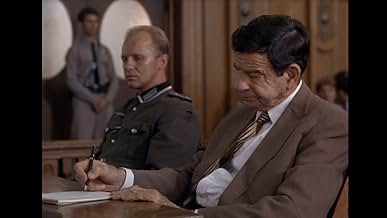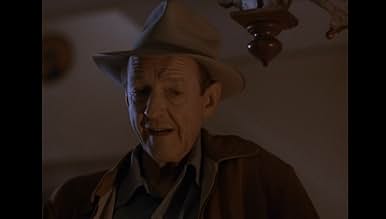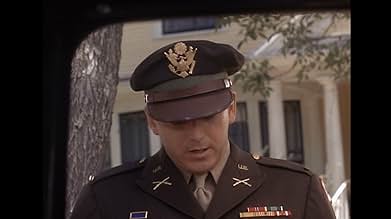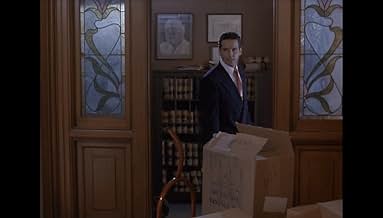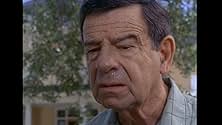PUNTUACIÓN EN IMDb
7,1/10
800
TU PUNTUACIÓN
El abogado de un pueblo pequeño defiende a un prisionero de guerra nazi de los cargos de asesinato.El abogado de un pueblo pequeño defiende a un prisionero de guerra nazi de los cargos de asesinato.El abogado de un pueblo pequeño defiende a un prisionero de guerra nazi de los cargos de asesinato.
- Dirección
- Guión
- Reparto principal
- Ganó 2 premios Primetime Emmy
- 4 premios y 2 nominaciones en total
Joe Horváth
- Major Lilly
- (as Joe Horvath)
Robert MacKenzie
- Sergeant Osias
- (as Robert Mckenzie)
Reseñas destacadas
One of the earlier reviews of this fine little TV movie suggested that it stretched credulity to believe that German POWs would be found so far from Europe. Yet by the end of the war, over 375,000 German POWs were in several hundred camps throughout the United States, mostly in the South and Southwest, far from critical war industries in the Midwest and along the Eastern seaboard. There were over 425,000 total Axis prisoners in the US by 1945.
The Incident is a really well-made movie. Director Joseph Sargent, still at it in his late 70s or early 80s, created memorable TV and theatrical films such as "The Marcus Nelson Murders" (to become Kojak), "The Taking of Pelham One Two Three", "Miss Evers' Boys", and "A Lesson Before Dying."
The Incident is a really well-made movie. Director Joseph Sargent, still at it in his late 70s or early 80s, created memorable TV and theatrical films such as "The Marcus Nelson Murders" (to become Kojak), "The Taking of Pelham One Two Three", "Miss Evers' Boys", and "A Lesson Before Dying."
This movie was interesting and unpredictable. Walter Matthau is ordered by a federal judge to defend a German POW accused of killing the town's doctor. He doesn't want the job and has no defense to present. The townfolks react badly at times to him having the case, but fortunately the reaction is mild and the movie doesn't dwell on that, as a million other movies have done. There is no real threat to him or his daughter-in-law or granddaughter.
William Schallert, the town cop and a family friend, ends up helping Mr. Matthau look for evidence of what happened the night the doctor was killed. They find out something shocking. Just as it's revealed the judge has a shocking agenda. But is the prosecuting attorney in on it, too? A well-done film that balances the events of a murder trial with a family dealing with the war on a very personal level.
William Schallert, the town cop and a family friend, ends up helping Mr. Matthau look for evidence of what happened the night the doctor was killed. They find out something shocking. Just as it's revealed the judge has a shocking agenda. But is the prosecuting attorney in on it, too? A well-done film that balances the events of a murder trial with a family dealing with the war on a very personal level.
In the early to mid-1990s, three TV movies were made starring Walter Matthau and Harry Morgan. Each story is about the same characters and it follows them over several years during the 1940s. I saw the second, "Against Her Will: An Incident in Baltimore" and had no idea it was a sequel or that there was a sequel to it. However, the acting and production were so good in "Against Her Will", I decided to find the other two films, "The Incident" and "Incident in a Small Town"...and, fortunately, all three are on YouTube.
This first movie has an impressive cast of familiar faces. In addition to Matthau and Morgan, Barnard Hughes, Robert Carradine, and William Schallert are on hand to provide support.
This film is set in Colorado* during WWII and soon after the story begins, a doctor (Barnard Hughes) is beaten to death at a nearby Prisoner of War camp. A German prisoner is soon charged with his murder and Herman Cobb (Walter Matthau) is shocked when he is chosen to represent the German. After all, Cobb's own son is in Europe fighting the Nazis and Cobb has no interest in the case. But the presiding judge (Harry Morgan) is insistent...and even threatens Cobb to get him to take the case.
Soon after taking the case, it becomes obvious that the prisoner's conviction is pretty much a foregone conclusion and perhaps that is why such a small-time lawyer was 'persuaded' to take the case! But there's far, far more to the story than this...and, believe it or not, it's based on real cases which occurred during the war...cases in which German prisoners were murdering other German prisoners!
The acting in this film is simply supurb....which is what I'd expect with such a cast. Additionally, the writing and production itself clearly are stellar as well. In fact, it's so good that it's surprising it was made for TV...but not at all surprising that the film led to the sequels.
*Oddly, the film is set in the Colorado area but the sequel is in Anne Arundel County, Maryland. Apparently, the Judge moved from Colorado to Maryland...though this was never explained.
This first movie has an impressive cast of familiar faces. In addition to Matthau and Morgan, Barnard Hughes, Robert Carradine, and William Schallert are on hand to provide support.
This film is set in Colorado* during WWII and soon after the story begins, a doctor (Barnard Hughes) is beaten to death at a nearby Prisoner of War camp. A German prisoner is soon charged with his murder and Herman Cobb (Walter Matthau) is shocked when he is chosen to represent the German. After all, Cobb's own son is in Europe fighting the Nazis and Cobb has no interest in the case. But the presiding judge (Harry Morgan) is insistent...and even threatens Cobb to get him to take the case.
Soon after taking the case, it becomes obvious that the prisoner's conviction is pretty much a foregone conclusion and perhaps that is why such a small-time lawyer was 'persuaded' to take the case! But there's far, far more to the story than this...and, believe it or not, it's based on real cases which occurred during the war...cases in which German prisoners were murdering other German prisoners!
The acting in this film is simply supurb....which is what I'd expect with such a cast. Additionally, the writing and production itself clearly are stellar as well. In fact, it's so good that it's surprising it was made for TV...but not at all surprising that the film led to the sequels.
*Oddly, the film is set in the Colorado area but the sequel is in Anne Arundel County, Maryland. Apparently, the Judge moved from Colorado to Maryland...though this was never explained.
I've *just* finished watching this movie on a fuzzy, out-of-range over-the-air television station and I completely agree with the previous comment that this is a good little made for television movie and it could have made a pretty enjoyable series. It's undeniably Matlockesque, but with Walter Matthau as the nosy attorney it has a markedly different tone than that of the popular series starring Andy Griffith.
The "differentiator" for this show is that it's set as a period piece, though the writing isn't especially deft at pulling you into the time period and some of the details (such as prisoner's clothing) is likely incorrect for the period.
IMDb indicates that there are two more of these shows... and sure enough, even as I write this comment, the second "episode" of this "movie series" has started running on that over-the-air station. You can't help but think that this may have been an abortive (or unsteady) attempt to take these characters into a regular series.
Really, if you have the chance to catch it on cable or order it from your favorite DVD rental house, give this show a whirl. If nothing else, you'll enjoy seeing Harry Morgan (of M*A*S*H fame) playing a crusty old judge with a strange hate/pity relationship with Matthau's lazy-man attorney... good stuff!
The "differentiator" for this show is that it's set as a period piece, though the writing isn't especially deft at pulling you into the time period and some of the details (such as prisoner's clothing) is likely incorrect for the period.
IMDb indicates that there are two more of these shows... and sure enough, even as I write this comment, the second "episode" of this "movie series" has started running on that over-the-air station. You can't help but think that this may have been an abortive (or unsteady) attempt to take these characters into a regular series.
Really, if you have the chance to catch it on cable or order it from your favorite DVD rental house, give this show a whirl. If nothing else, you'll enjoy seeing Harry Morgan (of M*A*S*H fame) playing a crusty old judge with a strange hate/pity relationship with Matthau's lazy-man attorney... good stuff!
As always, I was impressed by Walter Matthau's performance in this movie. Matthau played Harmon Cobb, a small town lawyer during the Second World War who is assigned to defend a German prisoner of war (Peter Firth) accused of murdering the local town doctor (Barnard Hughes.) The case seems open and shut, and Cobb's basic role - as he is clearly told by the presiding judge (Harry Morgan) - isn't to mount a serious defense; it's merely to make the process look good. (In fact, the judge makes it clear that he assigned Cobb because he believed Cobb to be incompetent.)
Cobb has to deal with the antipathy of the townsfolk, who are convinced of Geiger's guilt, as well as his own anti-German feelings (as a World War I vet, and especially after he receives news that his son was killed in Europe.) But he ultimately settles into the role he's been given, and gradually uncovers an unsavoury cover-up taking place at the POW camp with the full knowledge of its commander (Joe Horvath.)
This is a surprisingly good story that does keep the viewer guessing most of the way through. Ultimately, I found it to be a little too far fetched to really be believable (which knocked it down a couple of notches in my estimation) but it was still a pretty good who-dun-it sort of mystery.
7/10
Cobb has to deal with the antipathy of the townsfolk, who are convinced of Geiger's guilt, as well as his own anti-German feelings (as a World War I vet, and especially after he receives news that his son was killed in Europe.) But he ultimately settles into the role he's been given, and gradually uncovers an unsavoury cover-up taking place at the POW camp with the full knowledge of its commander (Joe Horvath.)
This is a surprisingly good story that does keep the viewer guessing most of the way through. Ultimately, I found it to be a little too far fetched to really be believable (which knocked it down a couple of notches in my estimation) but it was still a pretty good who-dun-it sort of mystery.
7/10
¿Sabías que...?
- CuriosidadesBarnard Hughes and Helen Stenborg, who portray Dr. and Mrs. Hansen, were married for 56 years (1950-2006).
- PifiasWhen the Lieutenant tells Walter Matthau that his son was killed, the Lieutenant is wearing an Army Commendation Medal on his uniform. The ARCOM or Army Commendation Medal was established by the War Department on December 18, 1945, well after WWII was over.
- Citas
Harmon Cobb: What am I gonna do?
- ConexionesFeatured in The 42nd Annual Primetime Emmy Awards (1990)
Selecciones populares
Inicia sesión para calificar y añadir a tu lista para recibir recomendaciones personalizadas
Detalles
Contribuir a esta página
Sugerir un cambio o añadir el contenido que falta

Principal laguna de datos
By what name was El incidente (1990) officially released in Canada in English?
Responde
